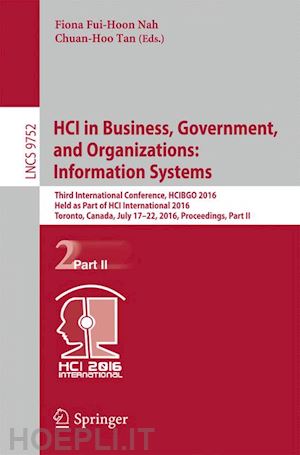
Questo prodotto usufruisce delle SPEDIZIONI GRATIS
selezionando l'opzione Corriere Veloce in fase di ordine.
Pagabile anche con Carta della cultura giovani e del merito, 18App Bonus Cultura e Carta del Docente
This volume constitutes the refereed proceedings of the Third International Conference on HCI in Business, Government and Organizations, HCIBGO 2016, held as part of the 18th International Conference on Human-Computer Interaction, HCII 2016, which took place in Toronto, Canada, in July 2016. HCII 2016 received a total of 4354 submissions, of which 1287 papers were accepted for publication after a careful reviewing process.
The 43 papers presented in this volume were organized in topical sections named: designing information systems; HCI in the public administration and government; HCI at work; and mobile applications and services.
Designing Information Systems.- User-Centred Requirements Analysis and Design of an Online Patient Interface for Chronic Disease Self-Management.- Defective Still Deflective – How Correctness of Decision Support Systems Influences User’s Performance in Production Environments.- Building a Classification Model for Physician Recommender Service Based on Needs for Physician Information.- Flow and the Art of ERP Education.- Accessible Learning Experience Design and Implementation.- Better patient-doctor communication – a survey and focus group study.- The Contextual Complexity of Privacy in Smart Homes and Buildings.- Investigating HCI challenges for Designing Smart Environments.- The Influence of Personality on Users’ Emotional Reactions.- Colour arousal effect on users’ decision-making processes in the warning message context.- HCI Testing in Laboratory or Field Settings.- A Structure-Behavior Coalescence Method For Human-Computer Interaction System Requirements Specification.-HCI in the public Administration and Government.- Collaboration between Cognitive Science and Business to benefit the government sector.- Gamification Aspects in the Context of Electronic Government and Education: A Case Study.- Aligning Public Administrators and citizens on and around open data: an activity theory approach.- Touchscreen voting interface design for persons with dexterity impairments: Insights from usability evaluation of mobile voting prototype.- As Simple as Possible and as Complex as Necessary - A Communication Kit for Geothermal Energy Projects.- Planning Effective HCI Courseware Design to Enhance Online Education and Training.- “Core” Components in HCI Syllabi: Based on the Practice of CS and LIS Schools in North America.- Identification of Future Human-Computer System Needs in Army Aviation.- Bringing service design thinking into the public sector to create proactive and user-friendly public services.- The City as an Interface between Citizens and Public Administrations.- Exploring Human-Technology Interaction in Layered Security Military Applications.- An Agent-Based Study on the Relationship between Tiao-kuai Structure and Fragmentation Phenomenon of Crisis Governance.- A Toolkit for Prototype Implementation of E-Governance Service System Readiness Assessment Framework.- HCI at work.- Prevalence of Mobile Phone Interaction in Workplace Meetings.- Data Glasses for Picking Workplaces - Impact on Physical Workloads.- Degradations and consequences of ICT in occupational prevention terms as illustrated by the transport and logistics sector.- Human-Robot Interaction Modelling for Recruitment and Retention of Employees.- Operator Information Acquisition in Excavators - Insights from a Field Study using Eye-Tracking.- Extending the Effective Range of Prevention through Design by OSH Applications in Virtual Reality.- Scoping Review on Human-Machine Interaction and Health and Safety at Work.- A Model Based Approach to Web Application Design for Older Adults using MVC Design Pattern.- Using Smart Glasses for the Inclusion of Hearing-Impaired Warehouse Workers into their Working Environment.- Biological, Biomimetic and Sociological Aspects of Human-Robot Interaction in Work Environments.- Where is Siri? The Accessibility Design Challenges for Enterprise Touchscreen Interfaces.- Mobile applications and services.- Evaluation approaches for HCI related aspects of occupational safety regulations examplified by mobile hotel booking applications.- Distracted Driving: Scientific Basis for Risk Assessments of Driver’s Workplaces.- Patient Engagement in the Medical Facility Waiting Room Using Gamified Healthcare Information Delivery.- Understanding User Experience Journeys for a Smart Watch Device.- Designing and Evaluating Barrier-Free Travel Assistance Services.- Wearable Technology in Hospitals: Overcoming Patient Concerns About Privacy.- Adoption of Smartphone Apps by Hotel Guests: the Roles of Trust and Word of Mouth.











Il sito utilizza cookie ed altri strumenti di tracciamento che raccolgono informazioni dal dispositivo dell’utente. Oltre ai cookie tecnici ed analitici aggregati, strettamente necessari per il funzionamento di questo sito web, previo consenso dell’utente possono essere installati cookie di profilazione e marketing e cookie dei social media. Cliccando su “Accetto tutti i cookie” saranno attivate tutte le categorie di cookie. Per accettare solo deterninate categorie di cookie, cliccare invece su “Impostazioni cookie”. Chiudendo il banner o continuando a navigare saranno installati solo cookie tecnici. Per maggiori dettagli, consultare la Cookie Policy.